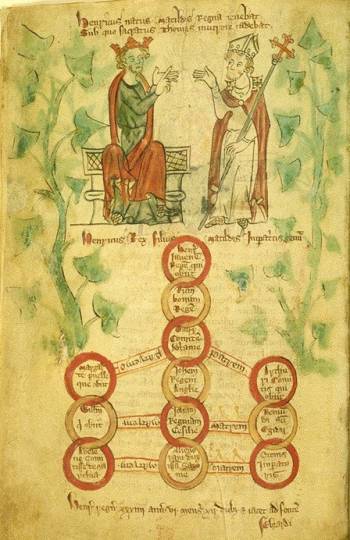|
Roger De Pont L'Évêque
Roger de Pont L'Évêque (or Robert of Bishop's Bridge; c. 1115–1181) was Archbishop of York from 1154 to 1181. Born in Normandy, he preceded Thomas Becket as Archdeacon of Canterbury, and together with Becket served Theobald of Bec while Theobald was Archbishop of Canterbury. While in Theobald's service, Roger was alleged to have committed a crime which Becket helped to cover up. Roger succeeded William FitzHerbert as archbishop in 1154, and while at York rebuilt York Minster, which had been damaged by fire. Roger did not become deeply involved in the dispute between King Henry II of England and Becket until 1170, when the King had Roger preside at the coronation of the king's son Henry the Young King, a function that would normally have been performed by the Archbishop of Canterbury. In retaliation Becket excommunicated Roger in late 1170, and some have seen this excommunication as one reason for King Henry's anger at Becket which led to Becket's murder. After being suspe ... [...More Info...] [...Related Items...] OR: [Wikipedia] [Google] [Baidu] |
Archbishop Of York
The archbishop of York is a senior bishop in the Church of England, second only to the archbishop of Canterbury. The archbishop is the diocesan bishop of the Diocese of York and the metropolitan bishop of the province of York, which covers the northern regions of England (north of the Trent) as well as the Isle of Man. The archbishop's throne ('' cathedra'') is in York Minster in central York and the official residence is Bishopthorpe Palace in the village of Bishopthorpe outside York. The current archbishop is Stephen Cottrell, since the confirmation of his election on 9 July 2020. History Roman There was a bishop in Eboracum ( Roman York) from very early times; during the Middle Ages, it was thought to have been one of the dioceses established by the legendary King Lucius. Bishops of York are known to have been present at the councils of Arles (Eborius) and Nicaea (unnamed). However, this early Christian community was later destroyed by the pagan Anglo-Saxons ... [...More Info...] [...Related Items...] OR: [Wikipedia] [Google] [Baidu] |
Provost Of Beverley Minster
Beverley Minster The Provost of St John's, Beverley (Beverley Minster) is a position said to have been created by Archbishop Thomas of Bayeux (1070–1100). The provost had responsibility for the administration of the lands owned by the minster and for the general revenues of the chapter. He was an external officer with authority in the government of the church, but with no stall in the choir and no vote in chapter. Most of the provosts of Beverley were appointed as a reward for their work as civil servants. The post was finally terminated during the Reformation. List of Provosts *Source:Durham University e-theses except when otherwise stated. * 1092–1109: Thomas (afterwards Archbishop of York, 1109–1114) * 1109-: Robert * c.1132: Thomas (Normannus) * c.1135: Robert * c.1141–1152: Thurstan * c.1153–1154: Roger de Pont L'Évêque * 1154–1162: Thomas Becket (afterwards Archbishop of Canterbury, 1162–1170) * by 1169–1177: Geoffrey BarlowPont l'Évêque, Roger de (c ... [...More Info...] [...Related Items...] OR: [Wikipedia] [Google] [Baidu] |
Vacarius
Roger Vacarius (1120–1200?) was an Italian authority in civil and canon law who was known to author the ''Liber pauperum'' which between the years 1190-1220 influenced the development of legal studies in the University of Oxford. According to Gervase of Canterbury, Vacarius became the first known teacher of Roman law in England. Life Vacarius was educated in and taught in Bologna from around 1140-1145. He was then brought to Canterbury, possibly by Thomas Becket, to serve as counsel to the archbishop of Canterbury, Theobald of Bec, in a struggle with Henry of Blois, Bishop of Winchester. The case ended favorably for Theobald in 1146. Vacarius next surfaces in 1149, when he taught, at Oxford, to crowds of those wealthy and those not. For the latter, he prepared a nine-volume compendium of the '' Codex Justinianus''. The book was reputed to resolve all of the legal questions commonly debated in the schools, and became a leading textbook in the emerging university. Often des ... [...More Info...] [...Related Items...] OR: [Wikipedia] [Google] [Baidu] |
King Henry II England And Thomas Becket
King is the title given to a male monarch in a variety of contexts. The female equivalent is queen, which title is also given to the consort of a king. *In the context of prehistory, antiquity and contemporary indigenous peoples, the title may refer to tribal kingship. Germanic kingship is cognate with Indo-European traditions of tribal rulership (c.f. Indic ''rājan'', Gothic ''reiks'', and Old Irish ''rí'', etc.). *In the context of classical antiquity, king may translate in Latin as '' rex'' and in Greek as '' archon'' or '' basileus''. *In classical European feudalism, the title of ''king'' as the ruler of a ''kingdom'' is understood to be the highest rank in the feudal order, potentially subject, at least nominally, only to an emperor (harking back to the client kings of the Roman Republic and Roman Empire). *In a modern context, the title may refer to the ruler of one of a number of modern monarchies (either absolute or constitutional). The title of ''king'' is us ... [...More Info...] [...Related Items...] OR: [Wikipedia] [Google] [Baidu] |

